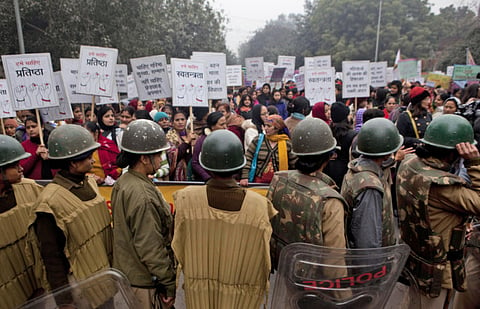India set for murder, rape charges in gang attack
Indian police preparing to file rape, murder charges against accused in Delhi case

NEW DELHI: Indian police were preparing Thursday to file rape and murder charges against a group of men accused of sexually assaulting a 23-year-old university student for hours on a moving bus in New Delhi.
The Dec. 16 attack on the woman, who later died of her injuries, has caused outrage across India and sparked demands for tough new rape laws, better police protection for women and a sustained campaign to change society’s views about women.
Police arrested six people in the case and planned to file charges Thursday in a new fast-track court in south Delhi that was inaugurated the day before to deal specifically with crimes against women, police spokesman Rajan Bhagat said. Police planned to ask for the death penalty in the case.
One of the attackers said he was a juvenile and authorities were conducting medical tests on him to determine whether to try him with the others or send him to juvenile court.
Indian Chief Justice Altamas Kabir said the accused should be tried swiftly, but cautioned that they needed to be given a fair trial and not subjected to mob justice.
“Let us not lose sight of the fact that a person is presumed innocent until proven guilty,” he told reporters Wednesday, while inaugurating the new fast-track court. “Let us balance things. Let us not get carried away. Provide justice in a fair but swift manner so that faith of people is once again restored that the judiciary is there behind the common man.”
The government is to set up four other such courts in the capital to hold timely trials in sexual assault cases, which often get bogged down for years in India’s notoriously sluggish court system.
The new courts will work to provide justice as swiftly as possible “so that the message is sent to all and sundry that these matters are going to be dealt with seriously,” Kabir said.
Many cases never even get to court in a country where there is intense social pressure against families reporting sexual assaults and where women are often blamed for the attacks they suffer. When women do report rapes, police often refuse to file charges and pressure the victims to reach a compromise with their attackers. In a sign that official attitudes toward such behavior might be changing, authorities in the state of Punjab dismissed two police officers and suspended a third last week on accusations they delayed investigating a reported gang rape and harassed the victim, who then killed herself.
Women’s activists hope that the rape and killing of the university student last month will mark a turning point in India’s behavior toward women. The victim, whose name has not been revealed, was attacked after boarding a bus with a male companion after watching an evening showing of the movie “Life of Pi.” The vehicle was a charter bus that illegally picked up the two passengers, authorities said. The driver was among the six arrested.
The pair were attacked for hours as the bus drove through the city, even passing through police checkpoints during the assault. They were eventually dumped naked on the side of the road. The woman, who was assaulted with an iron bar, suffered severe internal injuries that eventually caused her to die Saturday at a hospital in Singapore.
Media reports say police have gathered 30 witnesses, and the charges have been detailed in a document running more than 1,000 pages. Police also detained the owner of the bus used in the crime on accusations that he used false documents to obtain permits to run the private bus service.
The Bar Association said its lawyers would not defend the six suspects because of the nature of the crime, but the court is expected to appoint attorneys to defend them.
Since the attack, women have held near-daily protests and candle-light vigils in New Delhi, demanding action be taken to stop the daily harassment they face, from groping to even more violent attacks.
Also Thursday, the Supreme Court was expected to hear a petition demanding Indian lawmakers facing sexual assault charges be suspended from office.
Six state lawmakers are facing rape prosecutions and two national parliamentarians are facing charges of crimes against women that fall short of rape, said Jagdeep S. Chhokar, an official with the Association for Democratic Reforms, which tracks political candidates’ criminal records.
The petition from retired government administrator Promilla Shanker also asks the court to force the national government to fast-track thousands of rape cases across the country.



